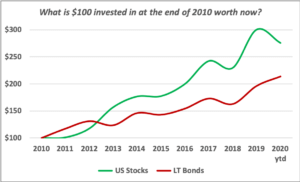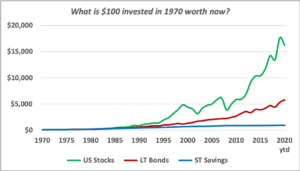Is now a good time to panic?
After the stock market turbulence of 2020, it’s understandable to ask if now is a good time to panic, but there’s no wholly satisfying answer. I don’t know what’s ahead for either the coronavirus or the direction of the stock market, but no one else does either.
Well that’s not very helpful. So what should one do in times like this?
First, keep some perspective.
What have the stock and bond markets done since the beginning of 2020?
- Stocks are down ~17% in 2020; they were up 30+% in 2019 so you’re ahead of where you were a year ago.
- Long-term bonds are up ~4% 2020; they were up 20+% in 2019. It’s been an extraordinary run for long-term bonds.
Long-term bonds yields are now at historic lows across the world. Mortgage and car loan rates will follow and trend down also.
Here’s a look at market returns over the past decade. In spite of the current panic, it’s been a very good time to be invested in stocks and bonds. Even after this Coronavirus Scare, stocks values have nearly tripled over the decade:

And, here’s a longer time period, dating back to 1970. I like to use a 50-year horizon because it roughly corresponds to the lifetime of a typical investor. Three things should be clear:
- Stocks out-perform bonds over long horizons.
- Stocks have been a very good investment, although it’s quite a roller coaster ride.
- Leaving your money in a bank savings account has never been a winning long-term strategy.

Second, focus on what you can control.
- Optimize the asset allocation (the mix of different asset classes) of your investments for your age, risk tolerance, and financial situation.
- Ensure your investments are well-diversified, including non-US stocks.
- Minimize your investment expenses such as mutual fund, variable annuity, and financial advisor fees.
- Minimize the investment taxes you incur by using tax-sheltered savings such as retirement accounts, HSAs, and college savings accounts.
- Evaluate re-financing your mortgage or other consumer debt.
- Maintain a long-time horizon. Maybe this time will be different, but one lesson from past stock market declines has been that the market will rebound at some point.
Third, tune out what you can’t control.
It’s a fool’s errand to try and out-maneuver the day to day volatility of investment markets. Markets and people are fickle, irrational, and vacillate between fear and greed. There’s little you can do to fight those collective emotions. Try doing nothing.
Also, don’t check your account balances. You may be filled with despair and inclined to make a move that you’ll later regret. Sometimes, the best answer is the meditative one:
Don’t just do something, sit there.
Easy to say, harder to do. Good luck riding out the storm.
PS: I previously wrote about how to think about investment risk. You can read that here.